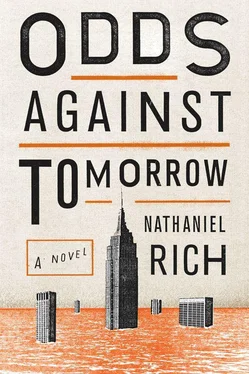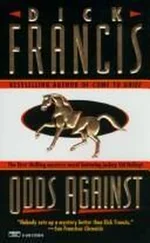Returning to Manhattan was impossible to imagine, but then everything was impossible to imagine. His imagination, once whorled and baroque with theories of superfiasco, had become a casualty of Tammy. Now when he thought about the future, all he found was blankness. There would be no long term. Jane’s scenario, in which he founded a new futurist firm, would certainly make him money — lots of it, enough to force his parents into retirement in Mission Hills. But the worst-case scenarios would return. That would be part of the bargain. They would be waiting for him in the middle of the night.
And for the first time since the flood, cockroach eggs began to hatch in the pit of his stomach.
* * *
The future had arrived. It assumed the shape of a long white rectangular box with two windows looking out over the narrowest part of the East River. A coffin with a view.
“I guess this counts as prime real estate,” said Jane, taking in the sight.
Their trailer, number 2199, looked no different from the thousands of other trailers arrayed in long rows across the baseball and soccer fields of Randall’s Island. The bedroom was just large enough for a double bed. In the bathroom the toilet nudged the shower stall. The main room contained a kitchenette with propane stove and mini fridge, a sofa upholstered in peach polyester, a matchbook-size dining table with two chairs. Two navy mesh FEMA baseball hats sat on the table, compliments of the federal government. The furniture was bolted to the floor. There was, significantly, no television. FEMA didn’t want the refugees to understand how bad it was in the city, how long they’d be stuck on Randall’s Island.
“Beachfront property,” said Jane. She went straight for the bed and flopped onto it.
The air in the trailer was tropical. Mold smeared the windowsills. The bedroom window gave a view of the northern tip of Astoria. A power plant stood there, its white smokestacks standing like the columns of an ancient ruin.
“Sleeping now,” she announced, her eyes already closed.
In the kitchen Mitchell set down his Go Bag and opened the fridge. The shelves were lined with aluminum cans. Across each can, in large black letters: FILTERED DRINKING WATER. Mitchell cracked one open and drank. The water had a mildly astringent aftertaste. Was that chlorine? Fluoride? Arsenic?
This was unsustainable. But was it worse than Overland Park? That was the calculation. If he returned, he’d immediately be pressed into service by Tibor. Mitchell, after all, was slumlord-in-waiting.
“New York is a wonderful place,” Tibor had said the last time they walked among the Zukorminiums. “Don’t get me wrong.” It was the week between graduation and Fitzsimmons, and Mitchell had reluctantly agreed one morning to accompany his father to his office. It was a decision he soon regretted.
They were truly hideous structures, the Zukorminiums, even worse than he’d remembered — redbrick, cruciform, seven stories tall, with laundry racks and satellite dishes hanging as ornaments from the windows. The buildings had been built to maximize profit per square foot; Tibor hadn’t taken human dignity into account. On the way to the administrative offices you had to follow a winding gravel path lined by shrubs flecked with plastic bags, dodging bottles of hobo wine, syringes, and soiled diapers. The condition of the Zukorminiums was shameful, but the shame didn’t reflect on the inhabitants. It reflected on Tibor. And Mitchell claimed it too; he felt the shame. It posed uncomfortable questions. For instance: Deep down, how different was his father from, say, Sandy Sherman? Both men were obsessed by financial gain; they were, in this way, sociopathic, seeking profit at the expense of human dignity. The protesters who picketed the Zukorminiums weren’t wrong when they argued that Tibor cared more about their checks than their human rights. “We have insects, terrible mold, rodents, insecto-infestations,” one woman told a local news reporter. “I’m up all night long making sure things don’t crawl on my kids.”
But none of this seemed to daunt Tibor. If anything, his pride had caused him to grow bolder. And now he was preparing Mitchell to take his place.
“Isn’t it dangerous for you to stay here?” Mitchell had asked. “Don’t you fear for your safety?”
Tibor laughed, stepping over a pile of what appeared to be human feces. “New York is also dangerous. You never know when something terrible will happen. I lived through Budapest in 1956. The revolution can burst out at any moment. That’s one of the great things about this place. There is no chance of revolution in Kansas City.”
A bag of garbage fell from the sky and detonated on the path behind them. They froze and looked up. An old woman was leaning out of her window, shaking her fist.
“Go back to commie Russia, Zukor!”
They hurried into Tibor’s office and shut the door, but even then Tibor seemed unbowed.
“ Monty Python and the Holy Grail , starring a certain Mr. John Cleese,” said Tibor.
Mitchell waited for the rest of it.
“‘One day, lad, all this will be yours.’”
No, he had thought. It most certainly would not. What was the Hungarian word? Nem . He would nem return to Kansas City, nem take over the Zukorminiums. Nem soha .
The FEMA trailer rattled. Someone was smacking the front door.
There were ten people standing outside. They wore ingratiating smiles. Mitchell’s first thought was that they were a delegation from the Zukorminiums, delivering complaints about asbestos and lead pipes.
Their leader, or at least the person who had knocked, was a pretty young Hispanic woman in librarian glasses. She held a newborn child against her shoulder.
“Are you the gentleman they call the Prophet?”
Mitchell stared at her in confusion.
She laughed apologetically. “I’m sorry to intrude. My name is Marcy Rosado. It’s just that, you see, we have some questions. And, well—” She gestured with her head to the baby. “We need the answers.”
“I’m sorry, I—”
“Mr. Zukor?” She wasn’t laughing anymore. “We need answers.”
6.
Who were all these people? Waiting on line outside the food tent, taking fluids intravenously in the medical trailers, lingering by the administrative desk in the hope of hearing news, any news, the children racing wildly around the island in unsupervised games of tag, the babies screaming. It was clear what they weren’t: Manhattanites. Many were first-generation immigrants. They didn’t have friends with guesthouses in other parts of the country; they couldn’t afford hotels or airfare. In many cases their entire family had lived on the same block. They were also stubborn: they didn’t want to start over. They planned to move back to their old neighborhoods and rebuild. A fog of high irritation had fallen over the camp. Hysteria, too — it buzzed in the air like a cloud of wasps. Occasionally the buzzing blistered into violence. Mitchell had already witnessed three fistfights. At breakfast a woman pulled another woman’s hair out over a bowl of cereal.
But the refugees seemed to be going out of their way to be friendly to Mitchell and Jane. If anything, they were too friendly. By the end of the meal Mitchell had met the Lipinskis of Rego Park, the Diazes and Motas of Gravesend, the Wolaczes of Greenpoint, and a passel of McIntyres, nearly twenty in all, great-grandpa Miles through baby Lola. The McIntyres were from Broad Channel, a narrow island in Jamaica Bay between Howard Beach and the Rockaways that, during the storm, had been entirely submerged. Since the side streets in Broad Channel alternated with canals, many residents owned boats. The McIntyres had stayed afloat in their own family fleet, sheltered in the inundated but relatively protected bay. Mitchell didn’t meet anyone from the narrow Rockaway peninsula, the city’s first line of defense against the Atlantic Ocean. The Rockaways were missing.
Читать дальше












